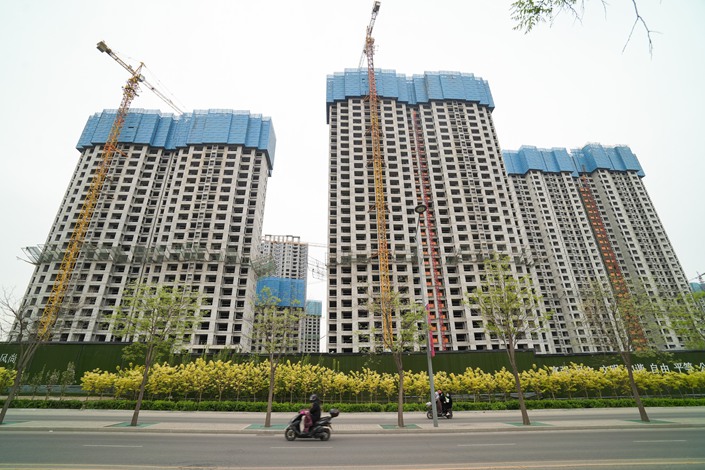
China’s housing sales could rebound in the second half of 2023 as the government eases its stance on Covid-19 and pumps financial aid into property companies, some analysts say. But the market still faces headwinds with low buyer confidence and insolvency risks for developers.
Policymakers this week began downplaying the threat of omicron and its subvariants in another sign they are looking to further relax tough restrictions. With this easing and the prospect of “zero-Covid” ending sometime next year, some economists see the housing market stabilizing, buoyed by an economic recovery and government support.
“Developers will likely report housing sales growth in the second half next year as some cities could be out of the epidemic by June, which would cause people’s expectations of their income to improve,” Zhang Zhiwei, chief economist at Pinpoint Asset Management Ltd., told Caixin Friday.
Housing sales could see year-on-year growth as soon as May, said Jiang Fei, chief macro analyst at brokerage Great Wall Securities Co. Ltd. in a note last week. He also estimated that housing prices will drop by around 5% in 2023, while forecasting further interest rate cuts to shore up demand and the roll out of more financing support for developers.
Meanwhile, state-owned enterprises will acquire some private developers’ projects to boost homebuyers’ confidence, Jiang added. Pinpoint’s Zhang predicted China would abandon expanding a property tax trial next year amid the sluggish market.
Analysts at Guosheng Securities Co. Ltd. said in a Tuesday note that real estate sales may pick up slightly to between 13.5 trillion yuan ($1.9 billion) and 14.9 trillion yuan in 2023, compared with a projected 13.5 trillion yuan for this year, although still far lower than the 18.2 trillion yuan in 2021.
And following the recent slew of support measures from regulators, net financing of the real estate industry will increase to between 400 billion yuan and 1.6 trillion yuan, up from an estimated 120 billion yuan for 2022 and negative 700 billion yuan in last year, the Guosheng analysts said.
But others are less optimistic. Global ratings giant Moody’s has predicted property sales will fall about 10% to 15% by the end of 2023 due to weak demand.
“The government’s recent actions to step up support for developers’ funding could improve the companies’ financial flexibility and partly temper their near-term refinancing pressures,” said Kelly Chen, a Moody’s vice president and senior analyst. “But the impact would be subject to the extent and timing, as well as the effectiveness of these measures.”
The housing supply is also considered sufficient in many places thanks to decades of construction and the impact of China’s falling birthrate.
A slow recovery of housing sales and potential price drop means less, if any, profits for property firms. As a result, Jiang at Great Wall estimated that investment in property development will decline by 4.8% next year.
Developers also face ever-present insolvency risks. Property companies have accumulated huge piles of high-interest-bearing debt investing in assets, which generated low returns, Zhang Bin, a researcher at the Chinese Academy of Social Sciences, said at an economics seminar last month.
“The investments are digging a hole for cash flow in the real estate industry because, in the past, property firms were able to fund the investment through housing sales and high profits. But it will be difficult to make up for the deficit in the future,” Zhang said.
Wang Jing contributed to this report.
Contact reporter Guo Yingzhe (yingzheguo@caixin.com) and editor Jonathan Breen (jonathanbreen@caixin.com)
Get our weekly free Must-Read newsletter.







